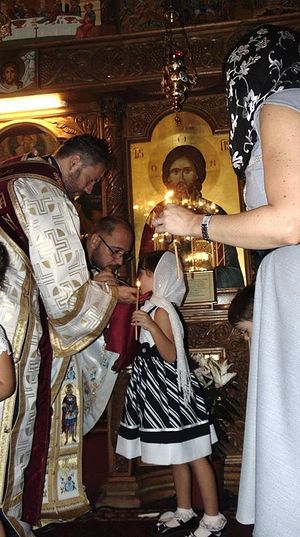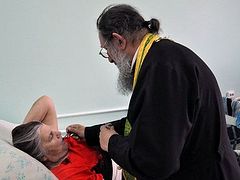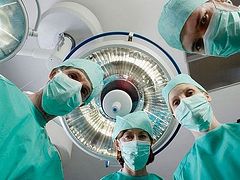My acquaintance with Stefan Mindea as a doctor delighted me, the meeting with Deacon Stefan Mindea brought heavenly comfort to my soul, the meeting with his family—his wife and six children—gave me the ineffable joy, and the meeting with Stefan Mindea as a human being was a true blessing for me.
He was born in Romania, grew up, studied and worked in America, and not long ago Deacon Stefan preferred to return to his native country. Actually, by making this decision he followed the spiritual advice of Elder Justin (Parvu; 1919-2013) whom he maintained close relations with.
In America he was Director of the Neurosurgery Department’s Minimally Invasive Spinal Surgery Program, co-Director of Spinal Oncology Surgery Program, teacher and Professor at Stanford University Medical Center, California. Today Doctor Mindea lives in Constanta, Romania, where he treats and operates on all sufferers regardless of their social status, and on Sundays he serves in one of the Orthodox churches of this major Romanian port town on the Black Sea. In spite of his extremely busy schedule Deacon Stefan has agreed to tell me about his life and some of his patients whose lives he miraculously saved by the Divine grace which works in a mysterious way.
I met him in one of Constanta’s private clinics. Having arrived there with a serious complaint, I entered the doctor’s consulting room where I was waiting for my medical assessment. But, seeing icons on the walls of the room, I immediately forgot my symptoms and fears which are normal for a sick person, feeling inexplicably comfortable and happy.
I was waiting for the university professor, Dr. Stefan Mindea, knowing that he had obtained his medical degrees at Northwestern University Medical School in Chicago and Stanford University School of Medicine. He specializes in general neurosurgery, minimally invasive spinal surgery, neuro-oncology (including spinal tumor surgery and spinal metastases), endoscopic surgery, radiosurgery, scoliosis, and spinal stenosis.
I thought that I would see an important and unapproachable man. But when I saw the professor enter the surgery I honestly felt as if it were somebody from the book of The Lives of the Saints! Tall, handsome, and meek, with a healing look, he literally chased out my pains; when he began to speak in a warm and affable way, I was speechless with surprise.
After my serious diagnosis had been confirmed by two previous doctors, I was sitting there, hoping that perhaps surgery would help me. According to those doctors’ opinion, I couldn’t avoid paralysis.
“There is no sign of this condition at all!” Dr. Mindea said on scrutinizing my MRI-scan. “You need no surgery! Let us try a method of treatment that has been practiced in America for some time and has proven very effective.”
I got back home in jubilation on that day! I forgot my illness and everything in the world. And I suppose you have guessed that by now I had only one thought in my mind: how to try and persuade him to give me an interview!
I met with him several times. The first meeting was the appointment that I’ve just spoken about; the second meeting was an unexpectedly protracted one: it was at the hospital’s operating room, when I saw Stefan saving patients’ lives; next I saw him during the Divine Liturgy at church where he served as a deacon; and, lastly, I made the acquaintance of his family—his fascinating wife and their six amazing children.
We should always give our sacrifices to God
—How did you find your path to God and remain faithful to your Romanian roots?
—I owe my grandmother all that I have. She was a simple peasant woman who left school after only four years, yet she possessed a great fear of God. When we moved to the USA, we were poor and unhappy, so our parents were very busy trying to ensure decent living conditions for the family. And our granny was with us all the time. She took us to church, told us about the power of prayer, and all of us siblings would keep fasts with her from the age of five or six.
Though we were quite small, we learned a lot from her, namely how important it is to be pious, to do good to people around us, and above all to offer our sacrifice to God (no matter how small it would seem) Who is so generous to us. These values that we absorbed in childhood have enormously helped me build my relationship with God; and the culmination of my spiritual development was when I met my future wife, an Orthodox Romanian. We are blessed with six wonderful children, and we are making efforts to pass on our Christian family values to them.
Family is a blessing that the Lord has abundantly bestowed upon me, and our whole family should always give sacrifices to God as a token of our eternal gratitude and humility. I will praise the Almighty for this priceless gift all my life.
In America I had Romanian friends who married Asian women and have since changed completely. It was sad to observe them losing their Romanian roots and identity, not to mention their faith and other values. If you swim with the tide and don’t try to get your life in order, you will never score a success or be helpful to your neighbors, because if you entrust yourself to chance alone you won’t get anything well-organized and systematized.
“At the anchor on the firm bond with the good God”
—How does faith help you in your work?
—It would be wrong to maintain that things always work out the way you want them to. Sick people tend to become incredulous and timorous, and if God doesn’t dwell in their hearts they succumb to various fears. That is why once the main signs of a disease have been diagnosed, we need to approach the patient’s soul with faith and love.
But in some cases you feel inadequate, as it were. In neurosurgery there are a lot of very complicated situations, so in difficult cases such as cancer or metastases you just lift your gaze to heaven and seek God’s guidance in decision-making. I usually pray from the moment a patient enters my room till the moment I decide to perform or not perform surgery on him; I earnestly ask the Lord to enlighten me and prevent me from operating on a patient who won’t survive a surgical intervention or if it proves ineffective. And during an operation, prayer gives me confidence and strength, and I will not raise the anchor on my firm bond with the good God.
“I am confident in you!”
—Have you ever been unsure of the outcome of a very difficult surgery when a patient has little chance of success?
—I had to perform extremely complicated operations. But the Lord has never abandoned me, and the problems were resolved with such great ease that I was unable to explain it. When I worked at Stanford, one patient came to me with a huge tumor that I needed to carefully remove from the tissue to prevent the spread of its cells into surrounding tissues. I was sure that it was beyond my power; however, my patient, a Chinese Christian, insisted that I should perform this surgery. Incredibly, he was one of the directors of the Apple Company, a very rich man who could afford surgery in any clinic in the world.
In my mind I started praying to God, saying that I was unable to operate on that patient as the complexity of his case exceeded my capacities. At length I summoned up my courage and went up to my patient’s bed, trying to explain the complexity of the situation to him: “Your condition is very complex, and only a few experienced specialists treat this disease. I must admit I have never removed tumors like this. I have treated difficult cases but I have not encountered a case like this yet.” But I proved unable to convince him. The man looked at me and said: “I am confident in you. I feel you will cope with it and I put myself in your hands.”
I was astonished, unable to understand the cause of such insistence. I was totally puzzled. At that time I lived in San Francisco, so the first thing I did was to go to the relics of St. John (Maximovitch) the Wonderworker. I was imploring God to illumine me, praying from the depths of my heart so that this situation could be happily resolved.
After several days and nights of unceasing prayer we had my Christian patient anointed with holy chrism, after which I came into the operating room, praying and wholeheartedly relying on the will of God. It was like obedience for me—I was praying whilst performing surgery! The patient was under general anesthesia permanently as I couldn’t predict how long the surgery would last. This type of operation normally lasts about twenty hours, and six to seven liters of blood are usually lost, which is surprising as there is only five to six liters of blood circulating in the human body. In other words, I had to transfuse my patient during the surgery.
To my great amazement, the operation lasted only ten hours (though twenty hours are a norm in such cases), and the patient lost less than one liter of blood. I didn’t know what to say! The success of that extremely difficult operation was a result of incessant prayer. I assure you with the fear of God that I myself witnessed this true miracle.
Afterwards I had to handle other similar cases with very complicated surgeries, and the Lord sent us His help in mysterious ways.
A day in the life of the neurosurgeon Stefan Mindea
—Taking into account that you are a neurosurgeon, a deacon, a husband, and a father at the same time, I am curious to know what an average day in your life looks like.
—Every day of mine starts with my prayer rule because if you don’t read your prayer rule in the morning you won’t have a good day. Sometimes I get very exhausted, but in this case I try to read my prayers during the journey to hospital.
When I get to the clinic, I need about half an hour to ponder over all the possible cases of the day ahead. I consider each case seriously and analyze it thoroughly, whether it is a mere appointment or treatment. The patients who need to undergo surgery are to be approached especially seriously and discreetly because the sick are susceptible to fear. I talk with each patient in person separately so that the patient can see me as his friend rather than a doctor. In my view, the most important thing for patients is to be fully convinced that all will be well. In most cases the sick are very emotional and get scared easily. That is why the doctor whom they put all their hopes in should instill in them confidence and optimism.
Another important factor is the way I communicate with my team that works side by side with me, not least in the operating room where I am expected to embody calmness and reliability.
First I make sure that I have done all my work properly and then give thanks to God for everything and go home. Seeing my family—my wife and our six children—in the evening is a true blessing for me. We have dinner together and then pray together, giving thanks to the good God for the joy that this day has brought us.









He and his wife lived in the same building and they helped me through my husband's cancer diagnosis.
We list touch and I would love to connect with them.
Do you have and way to contact them and have them reach out to me?
Please advise.
Thank you.
Janet Shepherd